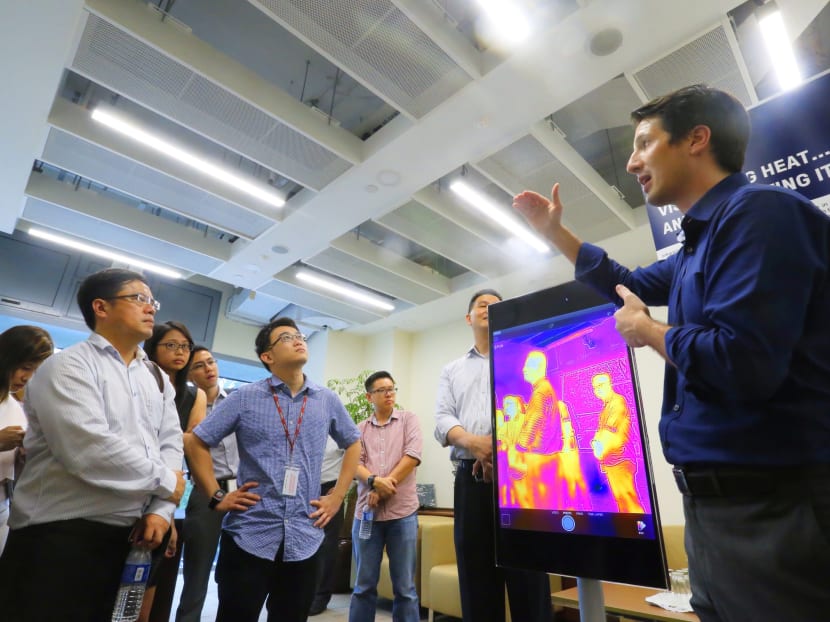UWC opens energy-efficient administrative office
SINGAPORE — The Dover campus of the United World College South East Asia (UWCSEA) has officially opened a new energy-efficient administrative office that will set a milestone in Singapore’s development of energy-saving architecture.

A tour conducted by 3for2@UWCSEA, the pilot implementation of the ‘3for2’ energy-efficient air-conditioning technology concept at the United World College of South East Asia (UWCSEA) today (Jan 19). Photo: Ernest Chua
SINGAPORE — The Dover campus of the United World College South East Asia (UWCSEA) has officially opened a new energy-efficient administrative office that will set a milestone in Singapore’s development of energy-saving architecture.
After four years of research at the Future Cities Laboratory of the Singapore-ETH Centre, the 550-square-metre 3for2@UWCSEA was opened as a pilot implementation of the 3for2 building design concept.
The 3for2 building concept is named so because it allows building developers to construct three floors within the standard space of two floors, without any impact on perceived floor-to-ceiling heights.
Since 3for2@UWCSEA has started operating at full capacity in December 2015, the project’s researchers have already begun combing through the data and it now shows that across three weeks of operation last month, the energy efficiency of the 3for2@UWCSEA office space is already among the top 10 per cent of large office buildings in Singapore.
Integrating design and construction, the 3for2 design concept proposes that new lean and energy-efficient technologies for air-conditioning and related services can be successfully integrated into building structures, thereby saving not only energy, but also considerable space and materials.
The project is developed by architectural and engineering researchers at the Singapore-ETH Centre, a research centre established by ETH Zurich and Singapore’s National Research Foundation as part of its CREATE campus.
Siemens has implemented its pioneering building management system Desigo CC, with over 1,000 sensor and control points feeding data into a web-accessible server at one-minute intervals.
During its grand opening launch held this afternoon (Jan 19), it was revealed that the initial estimations in efficiency is projected to reduce cooling energy by 40 per cent, facade material by 10 to 15 per cent, structural concrete by 20 per cent, installation space by 15 per cent; thus freeing up useable spaces by 10 to 20 per cent.
The technologies driving the building system, such as chilled ceilings and decentralised ventilation units, were first conceptualised and experimented on through four years of research. It focuses largely on air-conditioning techniques as air-conditioning accounts for approximately 60 per cent of energy consumption across the Singapore building stock. In addition, buildings consume about 50 per cent of Singapore’s total electricity.
Since the end of 2015, the 3for2@UWCSEA office space occupies part of a single floor in UWCSEA’s new 20,000 square-metres multi-purpose educational building, and has become home to the administrative and management staff of the UWCSEA.
Along with the grand opening of the project today, the core academic research of the 3for2@UWCSEA will be kicked off and is set to last until 2018.
Dr Adam Rysanek, senior researcher at ETH Zurich and project manager of the 3for2@UWCSEA said: “While we are pleased to see that our system is already performing among the most energy-efficient office buildings in Singapore, a number of our key performance objectives will only be realized towards the end of the project in two years’ time. Based on these initial performance indicators, we should be able to lower our energy footprint by a further 40 per cent upon fine tuning the systems we’ve already installed - and installing some new ones by 2018.”









